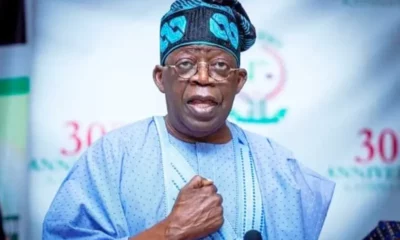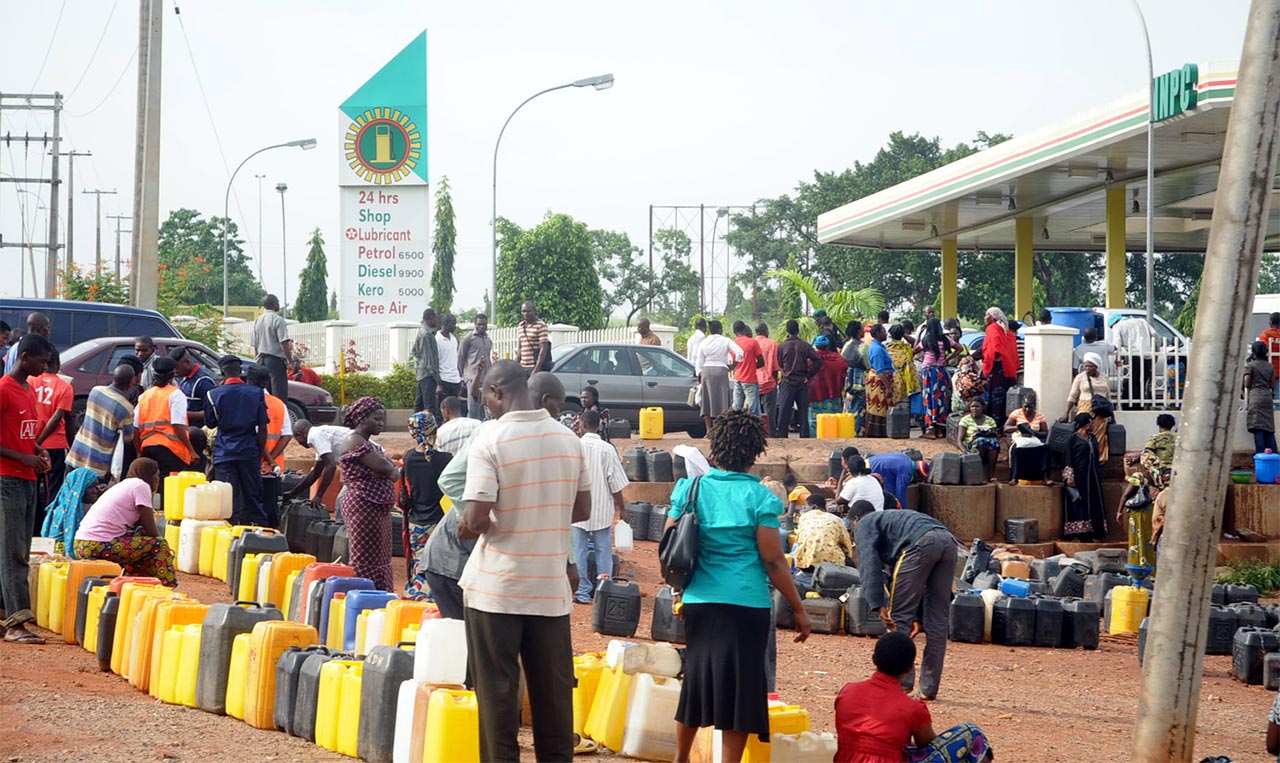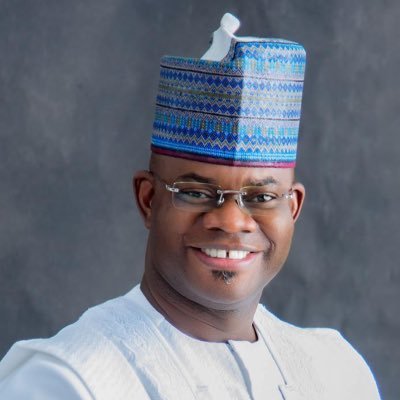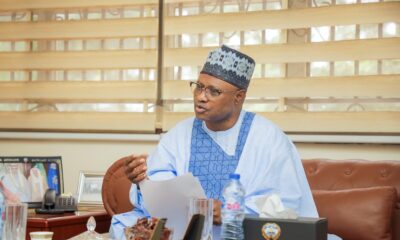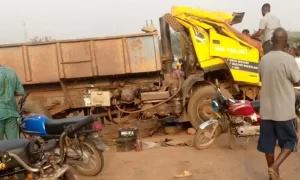The candidates were selected earlier this week by the presidential election debates group and a group of broadcast stations affiliated to the Broadcasting Organisation of Nigeria (BON).
Eddi Emesiri, the executive secretary of the Nigeria Election Debates Group, listed political parties that would participate as including: Allied Congress Party of Nigeria (ACPN); Alliance for New Nigeria (ANN); All Progressives Congress (APC); Peoples Democratic Party (PDP) and Young Progressives Party (YPP).
Vice President Yemi Osinbajo would participate at tonight’s debate as the running mate to President Muhammadu Buhari, both seeking to retain their office for a second term.
Peter Obi, a former governor of Anambra State and vice-presidential candidate of Atiku Abubakar would stand in for the PDP tonight. The VP candidates of ACPN, ANN and YPP are also expected to participate.
Imoni Amarere, a broadcaster with African Independent Television (AIT), is moderating tonight’s debate, and has already taken his seat as of 6:40 p.m. The debate is expected to kick off at 7:00 p.m.
The 2019 election is coming at a time of immense pressure on the Nigerian economy, with Nigeria recently rated as the country with the highest number of poor people in the world. Analysts expect the debates to be tilted towards this critical issue.
The participants are likely to take questions from other key areas of national importance, which could range from health and education policy to national security and foreign affairs. The Boko Haram remains a critical issue, especially as fears have mounted in recent months over the insurgents’ successful assaults on military formations.
The venue of the debate is the Transcorp Hilton Hotel.
Moderator Imoni Amarere says none of the candidates has seen the questions beforehand.
The candidates are called in alphabetical order.
Ganiyu Galadima of ACPN is the first to be called on stage. The candidate of the APC Yemi Osinbajo is called next.
Khadija Abdullahi of the ANN is called as the third person. Peter Obi of the PDP is here and called. Then the candidate YPP Umar Getso.
The National Anthem is now read and debate starts momentarily.
While the candidates debate in the hall, supporters of a presidential candidate, Omoyele Sowore, are protesting outside the venue against the non-inclusion of Mr Sowore and his running mate in the debates.
Each candidate has three minutes to give opening remarks. Ganiyu Galadinma of ACPN thanks the organizers and gives a glimpse of the failings of the ruling APC. He promises better governance.
Khadija Abdullahi of ANN introduces herself and gives her background as a “country builder”. Her profile is clearly rich with women programmes.
Yemi Osinbajo of APC goes next. Mr Osinbajo, the serving vice president, goes straight to the achievements of his party and lists items projects such as railways and payments to poor Nigerians.
Peter Obi of PDP reels out numbers. He focuses on job creation and assures his team will create jobs using the small and medium scale enterprises model as China did.
Umar Gesto of YPP says her party believes in a new Nigeria driven by the youth. She promises a new nation that will empower all Nigerians to achieve their dreams.
In his opening statement, Mr Galadima said Nigeria cannot continue to be the same. There is a need for Nigerians to look at the candidates and their manifesto.
Mr Galadima blames rising unemployment on poor policies of the Buhari administration. Mr Galadima slams the Buhari admin again for failing to properly address fuel crisis, saying the government spends over N2 billion on a subsidy it once described as nonexistence and fraud.
Ms Abdullahi-Iya says she is a graduate of the University of Abuja and has been working at non-governmental organisations for several years.
She demands a focus on the plight of children in the country. “I am concerned about every one of the over 2.1 million children” in the camps of internally displaced persons, she says.
She closes her opening remarks by demanding that everyone deserves a better life.
Mr Osinbajo says he is going straight to the current state of the Buhari administration. We expect the Lagos-Ibadan Railway to be ready soon. Kano-Maradi Railway is also under construction, as well as Lagos-Calabar Road.
Mr Osinbajo says the Lagos-Ibadan Expressway was abandoned for “practically 16 years”, and “practically every day” the government has been working to fix the crucial highway.
The VP says the government has made giant strides in agriculture, especially in the production of rice.
The micro-credit scheme under the larger social investments programmes of the Buhari administration has gone a long way to address poverty. Over 400,000 people have been lifted out of poverty.
Mr Obi started by reeling statistics to attack the Buhari administration. He mentions worsening inequality, misery index, the terrorism index, poverty index, unemployment, health, education and all other key indexes he said have shown that Nigeria is getting worse.
Mr Obi says SMEs are contributing to more than 60 percent to employment in China. He says China’s policies have guaranteed the country over seven million jobs annually, while Nigeria continues to lose over four million jobs per year.
The PDP candidate says Nigeria is in the current situation because of lack of jobs, and Atiku Abubakar is a man that could deliver on this and bring Nigeria out of the misery if elected.
Ms Getso says in her opening remarks that she is interested in the plight of poor people, given her deep background in charitable activities.
She promises a better Nigeria for citizens who are still trying to make ends meet.
Mr Galadima takes a question on whether the vice-president’s office an “extra tire” to the office of the president. He says the vice-president is as key as the president, especially as the Constitution gives the vice-president powers to take serious decisions on the country.
Mr Galadima acknowledges that the president’s office is higher than the vice-president’s but says they both ultimately work towards the same goal and of the same importance.
Ms Abdullahi-Iya says she is prepared to lead if elected the first female vice-president in the nation’s history.
She promises to ensure that the Nigerian economy is diversified and the country’s image as a mono-export economy would be done away with.
She says her humanitarian background and motherhood would help shape her policy decisions to ensure that people who matter are not left behind.
Mr Osinbajo takes a question on whether he finds the vice president’s office challenging. He says the Nigerian Constitution gives the vice president’s office specific roles like the chairman of the economic council and several departments and agencies.
He says the notion that the vice-president’s office is a spare to the president’s is not true. He says there must a pronounced working relationship between the president and the vice president, and once the trust has been established, there is a lot that could be achieved.
This, however, does not mean they do not argue on policy issues, but they are almost always resolved.
Mr Obi takes a question on what he would do if there is a fallout between himself and Mr Abubakar should they be elected. He responds first by saying there would be no crisis to begin with.
Mr Obi then moves on to discussing policy issues around the nation’s economy, saying there would be no time for rancour amongst the president and the vice president when there are roles for each person to play.
He says the two individuals would ordinarily recognise that they are in office for the benefit of the country.
Nearly an hour into the debate, it seems not all the candidates are able to respond accurately to the questions. It may be too soon to judge though.
Mr Amarere has reviewed the timing rules downwards from three minutes to answer each question to two minutes to answer the question and one minute for interjection or contribution to another participant’s response.
Ms Getso says she would focus on the economy and constitutional reforms first and power infrastructure second.
Mr Obi says Nigeria’s total capital market is worth about $30 billion, compared to South Africa which has over $900 billion.
Mr Obi takes another shot at the Buhari administration, saying it has stifled economic growth by failing to allow free market policies thrive.
Mr Amarere says Nigeria has about $18 billion aggregate investment. Mr Osinbajo says the growth in China and South Africa is driven by strong infrastructure.
He says the administration has focused on building infrastructure in order to address the challenges of a stunted growth.
Mr Osinbajo disagrees with the notion that fighting corruption is not an economic policy, saying fighting corruption could help loosen a lot of funds that might otherwise have gone into corrupt hands.
Mr Amarere has reviewed the timing rules downwards from three minutes to answer each question to two minutes to answer question and one minute for interjection or contribution to another participant’s response.
Osinbajo explains that petrol subsidy removal cannot be done now but should be a long term project. Peter Obi argues for the immediate removal of petrol subsidy.
Mr Galadima says there is a lot of inefficiencies in the subsidy regime, especially sharp practices by importers and even round-tripping.
He says the petroleum sector would be deregulated because subsidy is not in the interest of the common man, and the foreign exchange policies would be made more transparent in order to encourage investors.
Ms Abdullahi-Iya agrees, saying subsidy breeds corruption in Nigeria. She also says there is a need to ensure transparency in departments and agency, especially cutting-edge technologies that could help check corruption in public service.
Mr Osinbajo also tailors his response towards the same narrative, concluding that deep corrupt practices could attend subsidy regime.
But he argues that petrol prices could go as high as N220 per litre should Nigeria implement a total removal of subsidy. He cites an example of the United States, where the government subsidises agriculture.
He says a minimum subsidy is useful now to develop the capacity of the people, but it has to be gradually phased out, rather than a one-off removal.
Mr Obi says Nigeria is currently subsidising inefficiency, and petroleum sector is a packaged economy.
Nigeria has 10 cars per 1,000 people. Mr Obi says prices of petroleum would come down if the right things are done.
Ms Getso says Nigeria has been through brutal times over subsidy in the past when subsidy was removed. But when Mr Buhari actually removed subsidy and improved fuel prices but nothing changed, nothing was really done.
Subsidy to a Nigerian is just a scam, Ms Getso declares.
Mr Osinbajo says the question to be asked is how much Nigerians are willing to pay for a litre of petrol.
The closest candidates tonight have come to a common ground is the question of petrol subsidy. Most candidates agree it is fraudulent and should be removed.
APC’s Osinbajo, whose administration currently pays subsidy, of course argues it should be removed — but just not now!
Ms Abdullahi-Iya says the Buhari administration should answer what it is doing with the current earnings from petrol after hiking prices from N87 per litre to N145 about a year after assuming office.
Ms Getso says no country would grow if its import is higher than its export. She says her party would ensure massive manufacturing, especially by entering into a partnership with the private sector, in order to increase the country’s GDP.
Mr Obi takes a question on diversification. He says Nigeria should look at manufacturing as a major component of the economy. He says China has about 40 per cent of its GDP through manufacturing, because of how it is done with efficiency.
Mr Obi says the small and medium scale businesses should be supported, especially those in the manufacturing sector.
Mr Osinbajo says Nigeria’s SMEs have grown consistently since the administration came on board, with several policies specifically targeted at SMEs at several institutions currently underway.
He says the government has installed power in marketplaces, like the famous Ariaria Market in Abia State, as well as Sabon-Gari Market in Kano.
Ms Abdullahi-Iya says she would pursue a restructure of economies across state levels if elected vice president, which would make her the chairman of National Economic Council.
She says she would expand the nation’s economy through the establishment of special economic zones across the country and reduce the time it takes to travel to export zones.
Mr Galadima takes a question on taxes. He rails against multiple taxation, saying he felt strongly about the issue as a businessman.
He proposes tax incentives for new businesses coming into the country and local ones. He says the presidential candidate Oby Ezekwesili is a very brilliant economist and would ensure the right things are done.
Mr Osinbajo says tax thresholds are in place and they are being enforced to ensure that businesses have the best tax regimes possible.
Ms Abdullahi-Oya counters Mr Osinbajo, saying her experience as a businessperson is different from the image the VP has painted. She says corruption in tax payments should be addressed.
Mr Obi is asked about Nigeria’s advantage in African Continental Free Trade Agreement. Mr Obi says Nigeria has not signed the law, but should examine the treaty very well before signing up to it. He, however, says the country has a lot to gain from it as the biggest market.
Mr Obi says it is likely going to be a win-win for Nigeria, but manufacturers are raising concerns which should be looked into.
Mr Osinbajo says there is a process going on with the private sector to ensure that the agreement is properly scrutinised before it is signed.
He says process is underway to bring every critical players on board, and all the serious concerns raised would be addressed as a duty of a responsible and accountable government.
Ms Abdullahi-Iya also agrees that the agreement should be carefully dissected before Nigeria’s accents to it. We want to do business with other countries, but we need to know how much that agreement would affect our economy, she adds.
All five candidates argue against immediate signing of the African Continental Free Trade Agreement. They say there’s a need for thorough review of the agreement. Mr Galadima of ACPN says he thanks God Nigeria did not sign the free trade agreement because it would have been disastrous for the local economy. He says some industrial sectors that were once bustling for Nigeria have now been taken over by other Western African countries.
Ms Galadima says the Buhari administration should have consulted widely while the agreement was being drafted and not at the stage of signing.
He says the amount it costs to clear goods from Apapa Port is more than the price to bring them in from Europe.
Mr Osinbajo says there are so many other reasons why things are expensive and not just labour.
Mr Osinbajo says the CBN is an independent institution and he may not be able to dictate or speak about its policies, but said Nigeria has benefited immensely from the enforcement of foreign exchange restrictions on about 41 items.
Ms Abdullahi-Iya says the Nigeria’s petroleum sector should be reform, and refineries should be built. She also demands transparency in the petroleum sector.
The YPP candidate says patriotic leadership is what is missing in Nigeria and what her party will provide.
On foreign policy, all the candidates spoke about working with other nations while ensuring Nigeria’s interest is protected. They spoke on the partnership with other nations. Peter Obi spoke about an Africa first foreign policy while Osinbajo speaks on the review of the African free trade agreement as example of how Nigeria would ensure all international agreements are handled.
Debate ends. Candidates take a group picture with the organisers.




